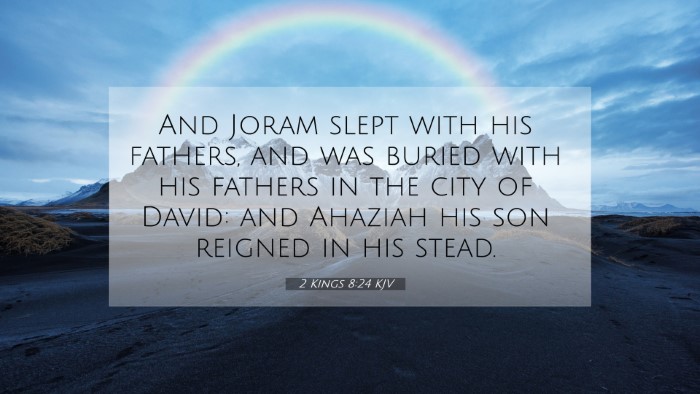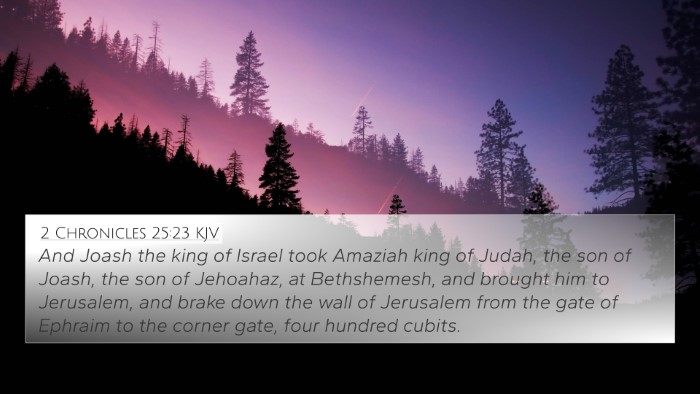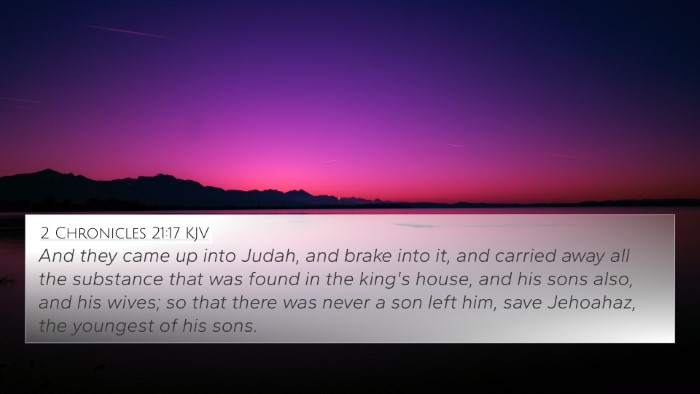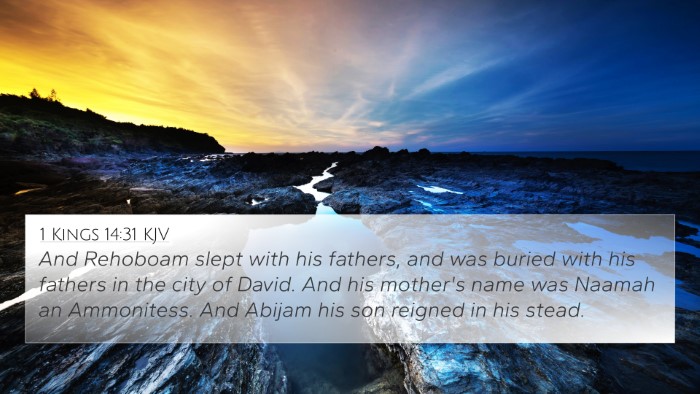Understanding 2 Kings 8:24
2 Kings 8:24 states, "And Joram slept with his fathers, and was buried with his fathers in the city of David: and Ahaziah his son reigned in his stead." This verse marks a significant transition in the history of the kings of Judah, indicating the end of Joram's reign and the beginning of Ahaziah's rule.
Historical Context
This passage occurs in the context of the history of the divided kingdoms of Israel and Judah. Joram, the son of Ahab and Jezebel, ruled over Israel. His reign was characterized by a turning away from God, following the evil practices of his parents. The mention of his death leads to discussions on the consequences of sin and the legacy of corrupt leadership.
The Significance of Kingship in Judah
- Succession of Power: Joram's death paves the way for Ahaziah to ascend to the throne, showing God's sovereignty in appointing rulers.
- Lessons in Leadership: The leadership of both Joram and Ahaziah is reflective of the wider themes in the biblical narrative about righteousness and its rewards, contrasting with wickedness and its consequences.
- Inter-Biblical Dialogue: The themes present here connect to other scriptures that discuss the responsibilities of rulers (e.g., Proverbs 29:2).
Commentary Insights
Matthew Henry's Commentary
Matthew Henry emphasizes the moral decline during Joram's reign and highlights how his death was a necessary step toward God restoring righteousness. His commentary reflects on the overall narrative of kings in Israel and Judah, noting the repeated cycle of sin, judgment, and restoration.
Albert Barnes' Commentary
Albert Barnes points out that this verse serves not only as a historical record but also as a theological statement about God’s justice. Joram's burial "with his fathers in the city of David" suggests an honor that contradicted the moral failings of his reign and affirms that physical descent does not equate to spiritual legacy.
Adam Clarke's Commentary
Adam Clarke provides an analysis of the significance of Ahaziah’s immediate rise to power, suggesting that the events of kingship in Israel were influenced by the broader spiritual state of the nation. He stresses the importance of leadership that aligns with God’s will, which becomes more critical as Ahaziah steps into his role.
Connections to Other Bible Verses
This verse can be interconnected with various other passages that illustrate themes of leadership, legacy, and God's judgment:
- 1 Kings 22:37-38: The account of Ahab's death, linking the downfall of his descendants.
- 2 Kings 1:17: A prophecy concerning Ahaziah, anticipating his short reign.
- 1 Chronicles 3:11-12: The genealogical records of the kings in Judah enhance the historical understanding.
- 2 Chronicles 22:1-9: Further details on Ahaziah's reign and its consequences.
- Jeremiah 22:18-19: Discusses the fate of unfaithful kings, echoing the legacy of Joram and Ahaziah.
- Proverbs 14:34: Righteousness exalts a nation; the contrast with Joram and Ahaziah's reign is evident.
- Isaiah 1:18-20: A call to repentance, reflecting the themes of turning back to God seen in the leadership transition.
Thematic Exploration
The narrative of 2 Kings 8:24 invites readers to reflect on several themes:
- Divine Sovereignty: Indicates that God is in control of the kingdoms, deciding who reigns.
- The Nature of Leadership: Stresses the importance of righteous leadership and the adverse effects of corruption.
- Aftermath of Sin: Samaria’s and Judah's histories are laden with consequences resulting from sinful leaders.
- Hope for Restoration: Even amid leadership failures, there is always a path prescribed by God for restoration.
Cross-Referencing Biblical Texts
For those engaged in Bible cross-reference study, examining connections between the reigns of Judah and Israel can yield valuable insights into divine providence and human choices. Tools for Bible cross-referencing can assist in tracing these themes more thoroughly.
Methodologies for Cross-Referencing
Using tools such as a Bible concordance or a cross-reference guide, readers can delve deeper into these themes. Understanding the inter-Biblical dialogue not only illuminates specific passages but also enriches the overall comprehension of Scripture.
Conclusion
2 Kings 8:24 serves as more than a historical marker; it is a reflection of the cyclical nature of leadership, the effects of moral decisions, and the overarching theme of divine sovereignty. By understanding this passage and its connections, readers can appreciate the intricate tapestry of biblical narrative and theology.
For Further Study: To gain a comprehensive understanding of related themes and narratives within the Bible, consider examining other scriptural parallels that discuss leadership and divine judgment.












